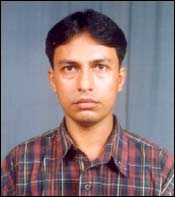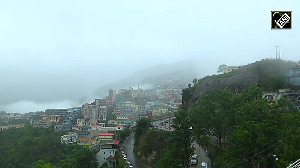Sayeed Khan, former president of the Students Islamic Movement of India's Mumbai unit, revolted in 1992 because of the presence of Inter-Services Intelligence operatives in the organisation.
Today, he is working hard to bring Muslim youths out of the anti-Gujarat mindset.
He has founded an organisation called MY India (Muslim Youth Of India), which is working hard to make Muslims youths feel a part of the country's mainstream.
He tells rediff.com how SIMI came under the influence of militancy and the goals he has set for My India.

In 1989, a few top SIMI leaders came under the influence of extremism and implemented extremist policies in the organisation. Although most of SIMI's youths were opposed to their ideas, they were incapable of stopping them.
In 1989, when Rajiv Gandhi opened the gates of the disputed structure (in Ayodhya for shilanyas) and L K Advani announced his rath yatra, Muslim sentiments were hurt and extremists, taking advantage of that, convinced the SIMI leadership to work for them.
Before this, SIMI was working to boost morale of youths, to spread education; it was trying to spread awareness about Islam. But the demolition of the Babri Masjid changed all that.Its youths started getting brainwashed to declare jihad. It was not the organisational policy, but the policy of two or three top leaders.
On the one hand I was fighting openly with SIMI's central leadership, and on the other the country's leaders were continuously giving Muslim hardliners topic after topic to misguide the youths.
When I saw a poster in a SIMI office saying 'Gaznavi, we are waiting for you. Babri Masjid is 2 km away', I realised things had gone out of hand. SIMI's motto had completely changed.
Since I was in Mumbai, India's financial capital, I could garner a lot of funds for the organisation. My family was well off, but I worked for SIMI as an ordinary member.
When I felt the central leadership was not giving importance to our views, SIMI's Maharashtra president, Zameerula Khan, and I decided to break the organisation in 1992.
| |||||||||||
Thus, we became a free SIMI cell. We retained the organisation's name because we were the real SIMI. People from Rajasthan, Aligarh, Bhopal, Nagpur, Kolkata supported us.
We also said we were over-ground, not underground like the central SIMI.
We ran the organisation for one and a half years. Later, the central SIMI leaders approached us with some kind of a formula. They told me that I do not have any right to run the organisation in the same name.
Later, they gave me a written undertaking that they would stop extremist activities. So we agreed to leave the organisation for them.
At that time I told them, 'If you do not do what you promise you would take this organisation towards death.'
They ditched me and continued their nefarious activities, with the result that the government banned SIMI.
A lot of Muslims had learned good things from SIMI. Even now, many Muslim leaders who are contributing to the society are part of SIMI. But militancy destroyed the outfit.
Some young SIMI members told me that some ex-presidents of the outfit wanted SIMI banned because they wanted to open separate outfits like the Tarike Aheya-E-Umad, Nahzetil Ulma, Dava CELL.
And these were the people who misguided SIMI. They thought once SIMI was banned, some of its members would join them and help them achieve their goals.
I worked under Saqib Nachen, Maharashtra president of SIMI. Nachen left SIMI in 1990 because of the age limit (30 years). He was a very devoted activist, very loyal, truthful man. But he came under the influence of some militant organisations.
After 1991, the Jamaat-e-Islami had stopped delivering intellectual/spiritual speeches to SIMI members because of its activities. So SIMI decided to call its ex-president for that purpose. Thus, Nachen again came close to SIMI and started delivering aggressive speeches to students.
I was convinced then that some ex-presidents were trying to corrupt the youth.
As told to Vijay Singh.





